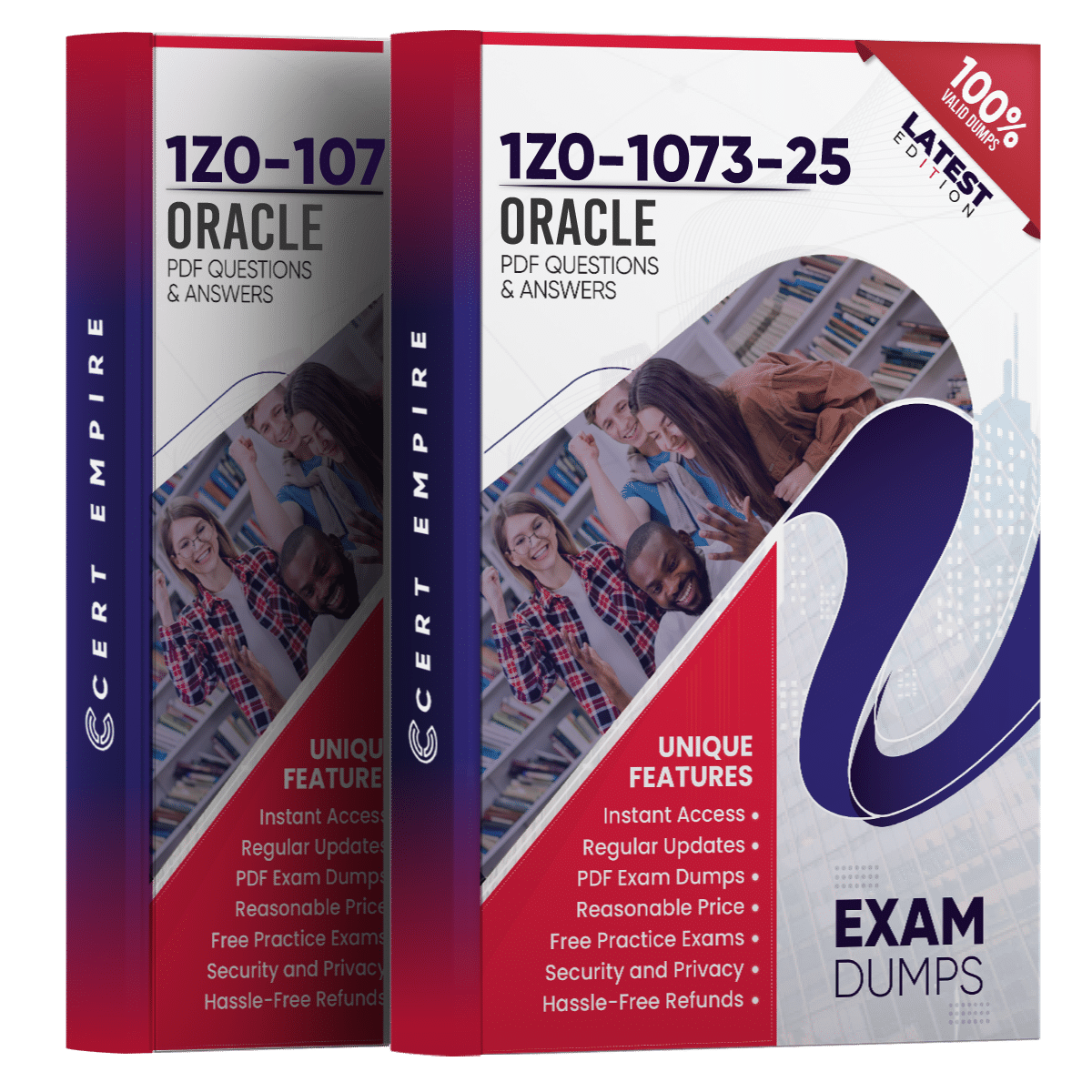About 1z0-1073-25 Exam
Oracle 1z0-1073-25 Certification Overview for 2025
The Oracle 1z0-1073-25 certification is purpose-built for professionals working in the Oracle Cloud Supply Chain Management ecosystem. It centers on Inventory Cloud, a core module that drives product, stock, and movement visibility across modern enterprise supply chains. This exam doesn’t focus on memorizing terminology; it targets your ability to configure and manage real-world inventory flows using Oracle’s Fusion Cloud. Candidates are expected to handle functional tasks with technical clarity and understand how various Oracle modules interlink during daily operations.
This exam fits into Oracle’s growing focus on certifying hands-on capabilities. The tech landscape in 2025 leans heavily toward cloud-first tools, and Oracle’s SCM suite is a major part of that shift. As demand for faster, integrated, and leaner warehouse operations increases, companies are asking for certified pros who already know how Oracle Cloud Inventory works from the inside out. That’s exactly what this cert is built to prove.
Why Oracle 1z0-1073-25 Certification Holds Value
Oracle has placed Inventory Cloud in a central role within its SCM platform. That means this certification isn’t optional for consultants looking to work in end-to-end Oracle implementations. It validates your ability to build, modify, and manage stock and inventory functions using Oracle’s current configurations and automation flows. By certifying this, Oracle signals to employers that the individual is ready to manage inventory setup and execution without extensive onboarding.
This isn’t just about technical understanding; the credential is a stamp of operational fluency. In companies using Oracle Cloud, implementation errors in inventory setups can lead to real revenue loss. Oracle understands this, and that’s why the exam is structured to focus on execution accuracy, not memorization.
Who the Exam Is Designed For
This certification is aimed at professionals who are either already working with Oracle Cloud SCM, or planning to shift their roles into cloud-based inventory systems. People in functional roles like inventory analysts, ERP consultants, or SCM specialists will find this certification directly aligned with their job responsibilities. Even those transitioning from Oracle EBS or hybrid systems into cloud workflows will benefit from this credential.
A basic understanding of Oracle applications is helpful, but what matters most is your ability to apply inventory logic to real scenarios. The cert supports professionals trying to become more strategic in supply chain design, stock movements, and transaction controls within cloud infrastructure.
What You’re Expected to Learn
This certification helps professionals gain skills that are directly tied to business impact. You’ll cover areas like:
- Setting up inventory organizations, locations, and subinventories
- Managing item creation, attributes, and catalog structures
- Creating and handling transaction types, movement requests, and transfers
- Understanding costing configurations and valuation strategies
- Controlling lot and serial tracking across all inventory transactions
- Mapping inventory flows into procurement, order management, and other modules
- Working with REST and SOAP APIs for data exchange
Every skill gained here has practical use within Oracle Fusion Cloud SCM. The exam expects that you not only know how to execute these tasks, but also why they matter within broader business operations.
The Difficulty and Real Learning Curve
This is not an easy certification if you’re walking in cold. Oracle doesn’t make the process too rigid, but the real challenge lies in the connections between modules. Inventory in Fusion Cloud is rarely isolated; it talks to other systems and pulls data from many sources. If you understand how inventory fits into the wider business system, you’ll do well.
People with past Oracle experience have an edge, but even those new to Oracle can crack it with the right preparation. Expect to spend several weeks learning how Oracle structures inventory data, handles costing, and processes transactions. It’s not complex, but it demands solid conceptual clarity and a bit of system exposure.
Common Roles After Certification
Once certified, professionals often move into specialized SCM roles or gain credibility in larger ERP implementations. This cert doesn’t just show Oracle knowledge; it shows that you’ve taken the time to understand cloud inventory in detail. Common roles include:
- Oracle Inventory Cloud Consultant
- SCM Implementation Analyst
- ERP Functional Consultant
- Inventory Business Analyst
- Cloud SCM Support Specialist
These roles are in demand across manufacturing, logistics, tech, and retail sectorsespecially for companies moving away from on-prem ERP.
Global Salary Overview
Here’s a breakdown of typical salary ranges based on region and role title:
|
Role Title |
Average Salary (USD) |
Region |
|
Oracle Inventory Cloud Consultant |
$105,000 |
United States |
|
SCM Implementation Analyst |
$92,000 |
Europe |
|
Functional Consultant (Oracle) |
$97,000 |
Asia-Pacific |
|
ERP Systems Specialist |
$88,000 |
Middle East |
Keep in mind that salaries can vary based on experience, company size, and project involvement, but these numbers reflect active job data for 2025.
Why Certified Inventory Pros Are Hired Faster
For employers, the cost of error in cloud inventory systems is high. Having someone certified means fewer mistakes, faster rollout, and less reliance on external consultants. Oracle-certified professionals help reduce configuration errors and improve system reliability from day one. That’s why this cert is often listed as a preferred or required qualification in SCM project roles.
Core Areas Covered in the Oracle 1z0-1073-25 Exam
The 1z0-1073-25 test is structured to reflect real system behavior in Oracle Inventory Cloud. It doesn’t ask for definitions or theory-based answers. Instead, questions focus on how configurations interact, how flows behave under different rules, and how changes in one module impact another. This is what makes the exam practical and aligned with job expectations.
Primary Functional Domains
Here’s a breakdown of core exam domains and their weight in the overall question pool:
|
Domain Topic |
% Weight |
|
Inventory Organizations and Structures |
18% |
|
Item Management |
20% |
|
Costing and Accounting Setup |
15% |
|
Lot/Serial Control |
12% |
|
Transactions and Transfers |
20% |
|
Integrations and Configurations |
15% |
These percentages show where your focus should go. Item management and transactions carry more weight, while costing and integration still hold enough share to influence your score.
Format and Structure of the Exam
The exam format is direct and practical. Here’s what to expect:
- Around 55–60 questions
- Format: Multiple choice, with some case-driven questions
- Duration: 85 minutes
- Scoring: Passing score hovers around 64%
The questions won’t try to trick you, but they will combine multiple concepts. For example, a single question might ask about how costing settings affect transfer orders and how those tie into procurement rules.
Common Pitfalls You Should Be Aware Of
Some parts of the exam trip people up more than others. Here are typical problem spots:
- Misunderstanding costing method effects on reporting
- Overlooking how subinventory transfers influence costing layers
- Confusing EBS-style workflows with Fusion SCM’s newer setups
- Missing integration points with Procurement and Order Management
Smart Prep Tips From Real Candidates
Candidates who’ve passed usually mention these tips:
- Focus on how modules connect, not just what each does
- Watch Oracle Learning videos on transaction and item flows
- Practice config scenarios from live test environments or trial accounts
- Review every wrong answer and learn why it was wrong
Oracle Docs Can Be Tricky but Useful
The official documentation is packed with insights but isn’t always user-friendly. Important configuration notes often sit in footnotes or table captions. Skipping these means missing the stuff Oracle actually asks about. Use the Docs after each learning session, not just before your test date.
Study Resources That Actually Work
A lot of people use courses or slide decks, but the most effective prep happens when you mix resources. Here are three to focus on:
- Oracle Guided Learning (Oracle’s own training path)
- YouTube tutorials that walk through live configurations
- Inventory Cloud sandbox labs where you can try actual setups
These resources help bridge the gap between just knowing and truly understanding how to execute tasks in Oracle Cloud Inventory.



Reviews
There are no reviews yet.